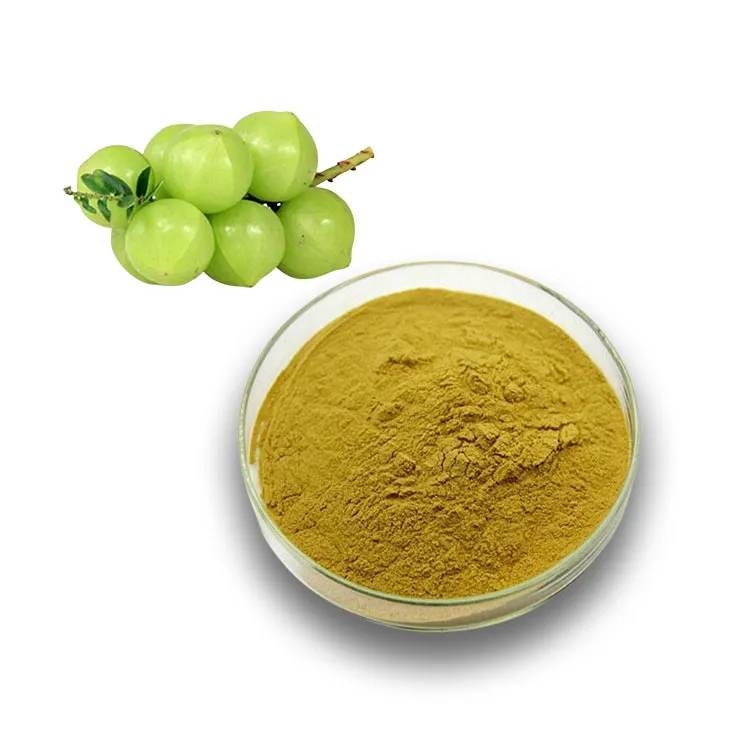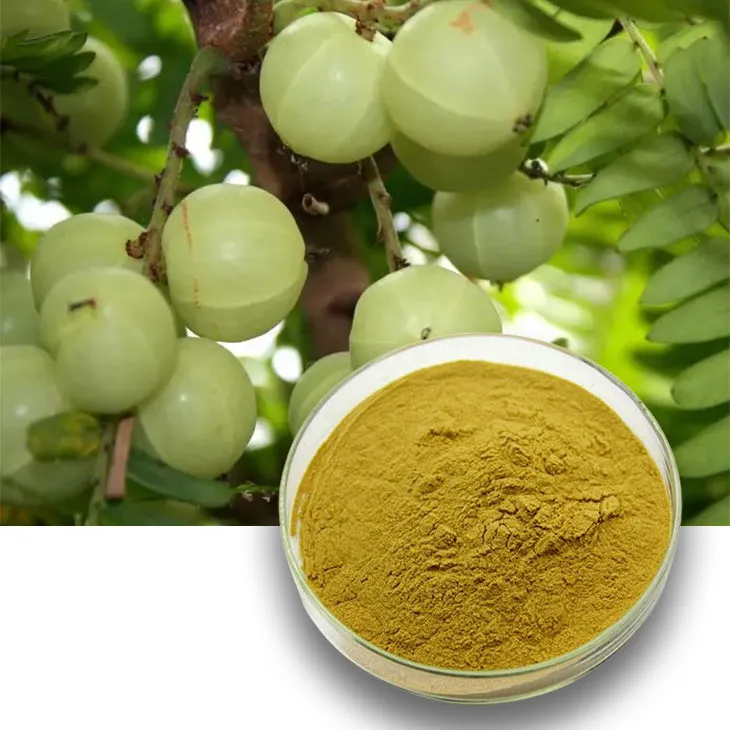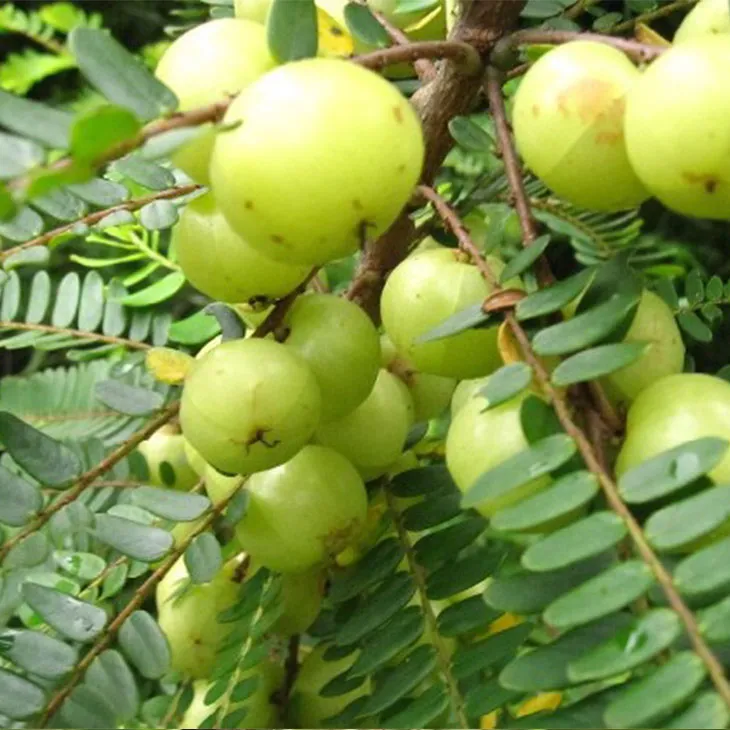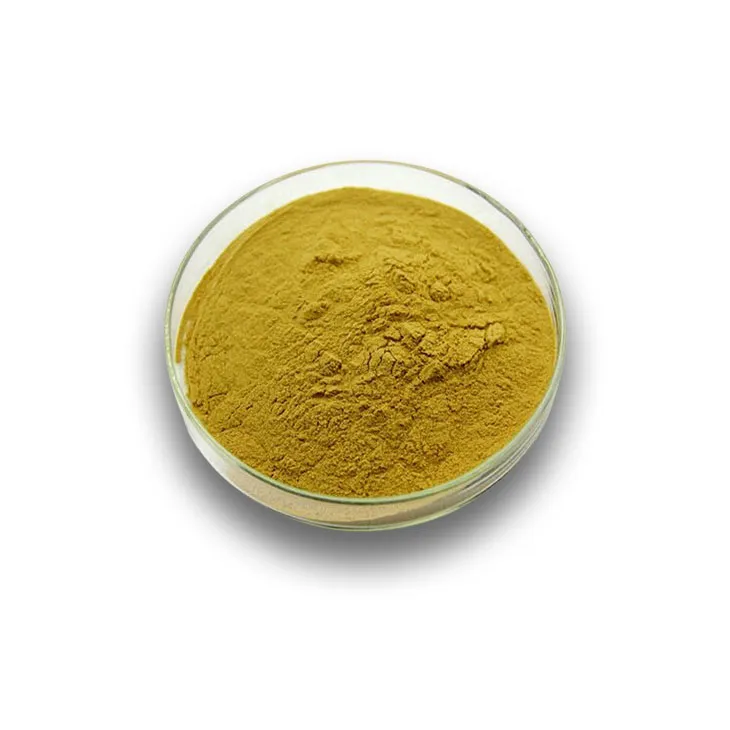- 0086-571-85302990
- sales@greenskybio.com
Extract Phyllanthus emblica extract by steam distillation.
2024-11-26

1. Introduction
Phyllanthus emblica, also known as Indian gooseberry, is a plant with a rich history in traditional medicine. It is native to India and other parts of Southeast Asia. The extract of Phyllanthus emblica has been found to possess numerous beneficial properties, making it a valuable ingredient in various industries, especially pharmaceuticals and cosmetics. One of the methods to obtain this extract is through steam distillation. This article aims to comprehensively explore the extraction of Phyllanthus Emblica Extract via steam distillation, including the principle behind it, the properties of the plant, and its significance in different industries.

2. The Principle of Steam Distillation
Steam distillation is a separation process that is based on the fact that the vapor pressure of a mixture of two immiscible liquids (in this case, water and the volatile components of Phyllanthus emblica) is equal to the sum of the vapor pressures of the individual components. When water is heated to its boiling point and turned into steam, the steam passes through the plant material (Phyllanthus emblica). The volatile compounds in the plant, which have a certain vapor pressure at the temperature of the steam, are vaporized along with the steam. As the steam - volatile compound mixture rises, it is cooled and condensed back into a liquid. Since the two components (water and the volatile extract) are immiscible, they can be easily separated, usually by using a separatory funnel. This allows for the collection of the Phyllanthus Emblica Extract.

3. The Unique Properties of Phyllanthus emblica
3.1 Nutritional Content
Phyllanthus emblica is rich in vitamins, especially vitamin C. In fact, it has one of the highest concentrations of vitamin C among fruits. It also contains minerals such as calcium, phosphorus, and iron. These nutrients contribute to its overall health - promoting properties.
3.2 Antioxidant Activity
The extract of Phyllanthus emblica is known for its strong antioxidant activity. Antioxidants are substances that can prevent or slow damage to cells caused by free radicals. Free radicals are unstable molecules that are produced during normal cell metabolism and can cause oxidative stress, which is linked to various diseases such as cancer, heart disease, and neurodegenerative disorders. The antioxidants in Phyllanthus Emblica Extract, such as flavonoids and tannins, scavenge free radicals and protect the body's cells from oxidative damage.
3.3 Anti - inflammatory Properties
Another important property of Phyllanthus emblica is its anti - inflammatory effect. Inflammation is a natural response of the body to injury or infection, but chronic inflammation can lead to various health problems. Studies have shown that the extract can inhibit the production of inflammatory mediators, reducing inflammation in the body. This makes it potentially useful in the treatment of inflammatory diseases such as arthritis.

4. Significance of Steam - distilled Phyllanthus emblica Extract in Pharmaceuticals
4.1 Medicinal Applications
- The antioxidant and anti - inflammatory properties of Phyllanthus emblica extract make it a promising candidate for the treatment of various diseases. For example, in traditional medicine, it has been used to treat liver disorders. The extract may help protect the liver from damage caused by toxins or diseases, and may also promote liver regeneration.
- It has also been studied for its potential in treating diabetes. Some research suggests that it can help regulate blood sugar levels by improving insulin sensitivity or by other mechanisms.
- Furthermore, due to its antioxidant activity, it may have a role in preventing or treating certain types of cancer. The extract can potentially inhibit the growth and spread of cancer cells, although more research is needed in this area.
4.2 Pharmaceutical Formulations
Steam - distilled Phyllanthus emblica extract can be incorporated into various pharmaceutical formulations. It can be used in tablets, capsules, or liquid preparations. The extract can be combined with other active ingredients or excipients to create effective medications. For example, it can be formulated with other herbs or drugs to enhance its therapeutic effects or to improve its bioavailability.

5. Significance of Steam - distilled Phyllanthus emblica Extract in Cosmetics
5.1 Skin Health Benefits
- The antioxidant properties of the extract make it beneficial for skin health. It can protect the skin from oxidative damage caused by environmental factors such as UV radiation, pollution, and free radicals. This can help prevent premature aging of the skin, including the formation of wrinkles and fine lines.
- It also has anti - inflammatory properties, which can be useful in treating skin inflammations such as acne, eczema, and psoriasis. The extract can reduce redness, swelling, and itching associated with these skin conditions.
5.2 Cosmetic Formulations
Phyllanthus emblica extract can be used in a variety of cosmetic formulations. It can be added to creams, lotions, serums, and masks. In these products, it can act as an active ingredient to provide skin - protecting and skin - improving effects. It can also be combined with other natural ingredients such as aloe vera, Green Tea Extract, or essential oils to create more effective and appealing cosmetic products.
6. The Extraction Process in Detail
6.1 Preparation of the Plant Material
The first step in steam distillation of Phyllanthus emblica extract is the preparation of the plant material. The fruits of Phyllanthus emblica are typically collected. They should be ripe and free from any signs of disease or damage. The collected fruits are then washed thoroughly to remove any dirt, debris, or pesticides. After washing, the fruits may be dried partially or completely, depending on the requirements of the extraction process.
6.2 The Steam Distillation Setup
- A steam distillation apparatus consists of a distillation flask, a condenser, and a receiving flask. The distillation flask is where the plant material and water are placed. A heat source, such as a Bunsen burner or an electric heater, is used to heat the water in the distillation flask. As the water boils, steam is generated and passes through the plant material.
- The condenser is used to cool the steam - volatile compound mixture. It is usually a coiled tube surrounded by a cooling medium, such as cold water. As the mixture passes through the condenser, it is cooled and condensed back into a liquid.
- The receiving flask is used to collect the condensed liquid. Since water and the volatile extract are immiscible, they will separate in the receiving flask, allowing for the easy collection of the Phyllanthus emblica extract.
6.3 Optimization of the Extraction Conditions
- The extraction efficiency of Phyllanthus emblica extract can be optimized by adjusting various factors. One important factor is the ratio of plant material to water. A proper ratio should be determined to ensure maximum extraction of the volatile compounds while avoiding excessive dilution of the extract.
- The extraction time also plays a role. Longer extraction times may result in a higher yield of the extract, but it may also lead to the extraction of unwanted compounds or degradation of the active components. Therefore, an optimal extraction time needs to be determined through experimentation.
- The temperature of the steam is another factor to consider. Higher steam temperatures may increase the vapor pressure of the volatile compounds and improve the extraction efficiency, but it may also cause thermal degradation of the plant material or the extract. A balance needs to be struck to ensure the quality and quantity of the extract.
7. Quality Control and Standardization
7.1 Analytical Methods
- To ensure the quality of steam - distilled Phyllanthus emblica extract, various analytical methods can be used. High - performance liquid chromatography (HPLC) can be employed to analyze the chemical composition of the extract. This method can identify and quantify the various active components in the extract, such as flavonoids and tannins.
- Gas chromatography - mass spectrometry (GC - MS) can also be used, especially for analyzing the volatile components of the extract. This method can provide detailed information about the chemical structure and composition of the volatile compounds in the extract.
7.2 Standardization
Standardization of the extract is important to ensure its consistency in quality and efficacy. This can be achieved by setting standards for the content of key active components. For example, a minimum or maximum content of flavonoids or tannins can be specified. Standardization also helps in regulatory compliance and in ensuring the reproducibility of the extract in different batches.
8. Conclusion
Steam distillation is a valuable method for obtaining Phyllanthus emblica extract. The extract has numerous beneficial properties, including antioxidant, anti - inflammatory, and nutritional properties. It has significant potential in both the pharmaceutical and cosmetic industries. However, proper extraction techniques, quality control, and standardization are essential to ensure the quality and efficacy of the extract. Further research is also needed to fully explore the potential applications of Phyllanthus emblica extract and to develop more effective extraction and utilization methods.
FAQ:
What is the principle of steam distillation for extracting Phyllanthus emblica extract?
Steam distillation is based on the fact that the vapor pressure of a mixture of two immiscible liquids is the sum of the vapor pressures of the individual components. In the case of Phyllanthus emblica, when steam is passed through the plant material, the volatile compounds in Phyllanthus emblica are vaporized along with the steam due to their relatively high vapor pressure at the distillation temperature. The vapor mixture is then condensed, and the resulting liquid separates into an aqueous phase and the extract phase containing the desired compounds from Phyllanthus emblica.
What are the unique properties of Phyllanthus emblica?
Phyllanthus emblica has several unique properties. It is rich in antioxidants such as vitamin C, phenolic compounds, and flavonoids. These antioxidants help in scavenging free radicals, which can have beneficial effects on health. It also has anti - inflammatory properties. In addition, Phyllanthus emblica has antimicrobial properties, which can be useful in various applications such as in pharmaceuticals and cosmetics to prevent the growth of harmful microorganisms.
Why is steam distillation important for extracting Phyllanthus emblica extract in the pharmaceutical industry?
In the pharmaceutical industry, steam distillation is important for extracting Phyllanthus emblica extract. Firstly, it can extract the active compounds without causing significant degradation, as the process is relatively mild. The extracted compounds may have medicinal properties such as antioxidant, anti - inflammatory, and antimicrobial activities which can be used in formulating drugs. Also, the extract obtained by steam distillation can be purified further for use in pharmaceutical preparations, ensuring the quality and safety of the final product.
How does steam distillation of Phyllanthus emblica extract contribute to the cosmetics industry?
Steam - distilled Phyllanthus emblica extract is valuable in the cosmetics industry. The antioxidant properties of the extract can help in preventing skin aging by neutralizing free radicals that damage the skin cells. Its anti - inflammatory properties can soothe irritated skin. The antimicrobial properties are useful for formulating products that are less likely to be contaminated by microorganisms. Moreover, the natural origin of the extract makes it an attractive ingredient for consumers who prefer natural - based cosmetics.
What are the challenges in extracting Phyllanthus emblica extract by steam distillation?
One challenge in steam distilling Phyllanthus emblica extract is the potential loss of some heat - sensitive compounds. The high temperature during steam distillation may cause these compounds to decompose or change their chemical structure. Another challenge is the proper separation of the extract from the aqueous phase after condensation. Ensuring complete extraction of all the desired compounds without co - extraction of unwanted substances is also a concern.
Related literature
- Steam Distillation of Medicinal Plants: A Review"
- "Phyllanthus emblica: Chemical Constituents and Their Pharmacological Activities"
- "The Role of Extracts from Phyllanthus emblica in Cosmetic Formulations"
- ▶ Hesperidin
- ▶ citrus bioflavonoids
- ▶ plant extract
- ▶ lycopene
- ▶ Diosmin
- ▶ Grape seed extract
- ▶ Sea buckthorn Juice Powder
- ▶ Beetroot powder
- ▶ Hops Extract
- ▶ Artichoke Extract
- ▶ Reishi mushroom extract
- ▶ Astaxanthin
- ▶ Green Tea Extract
- ▶ Curcumin Extract
- ▶ Horse Chestnut Extract
- ▶ Other Problems
- ▶ Boswellia Serrata Extract
- ▶ Resveratrol Extract
- ▶ Marigold Extract
- ▶ Grape Leaf Extract
- ▶ blog3
- ▶ blog4
-
Nature's Bounty Maitake Mushroom Extract.
2024-11-26
-
100% Pure Natural Fructus Aurantii Extract.
2024-11-26
-
100% Organic Fig Extract.
2024-11-26
-
Chinese Rose Hip Extract Powder Factory.
2024-11-26
-
White mustard seed extract
2024-11-26
-
Konjac Powder
2024-11-26
-
Apricot Powder
2024-11-26
-
Quercetin
2024-11-26
-
Senna Leaf Extract
2024-11-26
-
Nettle Root Extract
2024-11-26
-
Cocoa Extract
2024-11-26
-
Clove Powder
2024-11-26
-
Kidney Bean Extract
2024-11-26
-
Green coffee bean Extract
2024-11-26





















